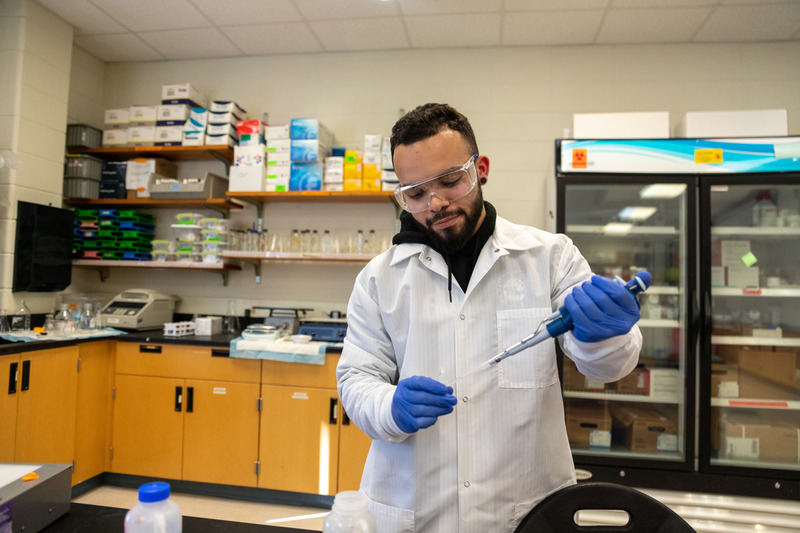


From community college to UD graduate student
Photo by Ashley Barnas Larrimore April 12, 2024
Connected Degree program helps medical sciences master’s student achieve goals
When he was in high school in Brooklyn, New York, Jake Peluso-Vargas never imagined he would be walking across the University of Delaware convocation stage once, let alone twice.
“I’m looking forward to walking that stage and getting that diploma,” he said. “That will be an awesome moment that I’ll never forget.”
Peluso-Vargas, a first-generation college student, will graduate with his master’s degree in medical sciences this May after spending just three years at UD. He came to UD’s College of Health Sciences through the Connected Degree program after obtaining his associate degree in biological sciences from Delaware Technical and Community College.
The 2+2 pathway allowed Peluso-Vargas to get his bachelor’s in applied molecular biology and biotechnology (AMBB) from UD in two years. Shortly after transferring to UD, Esther Biswas-Fiss, professor and chair of the Department of Medical and Molecular Sciences (MMSC), steered him toward the 4+1 program. For the first time, the first-generation college student imagined having an advanced, accelerated degree.
“I hadn’t really given graduate school a serious thought, but it sounded amazing to get my master’s in one year,” recalled Peluso-Vargas.
Biswas-Fiss was confident he would be an excellent fit for the program.
“From the outset, Jake displayed a significant degree of drive and motivation,” said Biswas-Fiss. “Science is never easy, and the key to success in this field is the level of interest. In addition to being a good student academically, he showed a high level of enthusiasm, essential for continued study at the graduate level.”
Come May, Peluso-Vargas will be the first student in the MMSC Department to complete a master’s degree starting at a community college.
“Being a first-generation college student who began my higher education journey at a community college, I believe it is essential for students to be informed about the various opportunities they have for pursuing advanced education, whether they joined UD as freshmen or as transfer students as part of our 2+2 pipelines,” Biswas-Fiss said.
Becoming a part of something bigger
Peluso-Vargas has always loved science. He was enrolled in the medical science institute at his high school, which challenged him with rigorous coursework. Those academic challenges continued in the MMSC Department at UD, where he called the curriculum “current, modern and applicable” to various professions.
Mona Batish, an associate professor of medical and molecular sciences, mentored Peluso-Vargas throughout his master’s program.
“She helped me hone my capstone project, which was on CRISPR gene editing and its application to treating medical diseases like HIV and Duchenne muscular dystrophy,” Peluso-Vargas said.
Throughout his studies, Peluso-Vargas learned what it takes to be a successful research scientist.
“Persistence, determination and tenacity,” he said. “In this field, working in research and lab settings, you must expect the unexpected. You should expect experiments to fail, and you must learn from those failures, adapt and try harder.”
His first experience with research — and UD — came when Peluso-Vargas entered the Delaware INBRE Summer Student Research Program after earning his associate degree. There, he studied the developmental biology of sea urchins with Jia Song, an associate professor of biological sciences in the College of Arts and Sciences, and got his first feel for UD’s campus. He hoped to be back one day.
“I realized that experiments are optimized in genetics class and biology labs,” Peluso-Vargas said. “In conducting independent research outside the classroom, I optimized my experiments and had to troubleshoot when something went wrong; I learned that persistence is key to obtaining reportable, valid results.”
The troubleshooting is what attracted him to research.
“I get a lot of gratification from exploring the unknown and getting answers through successful experiments,” he said.
Throughout his master’s studies, Peluso-Vargas worked as a quality control technician for a Newark biotechnology company. Unsure what he wants to do next, Peluso-Vargas intends to let his academic achievements sink in.
“Getting my bachelor’s was surreal,” he said. “Getting a master’s will just give me such satisfaction and gratification.”
Ultimately, he envisions himself working on gene therapy within the biotech industry.
“I want to develop therapeutics to treat and ultimately cure patients with genetic disorders,” he said. “It’s a growing field, and I want to be a part of it.”
He encourages other first-generation college students and transfer students to chase their dreams, regardless of their backgrounds.
“Neither of my parents graduated from high school, and my family reminds me how proud they are of how far I’ve come every single day,” he said. “It’s not always been easy, but that fuels me and is definitely a driving force behind my motivation to obtain my master’s.
“Sometimes people just need a chance or need steering in the right direction,” Peluso-Vargas said. “I think anyone can do it. When people are given an opportunity, that’s all they need.”
Contact Us
Have a UDaily story idea?
Contact us at ocm@udel.edu
Members of the press
Contact us at 302-831-NEWS or visit the Media Relations website

